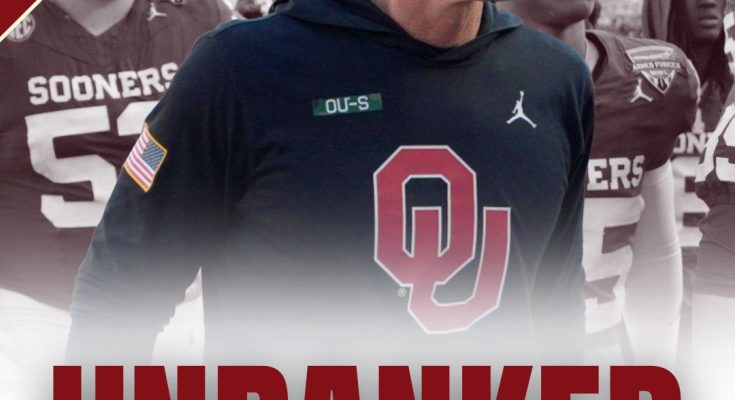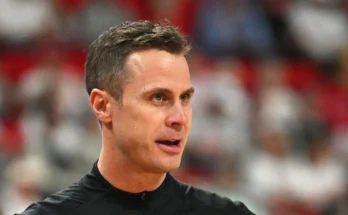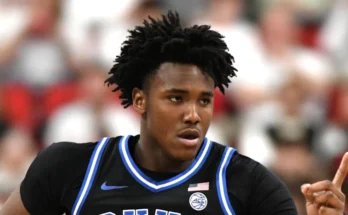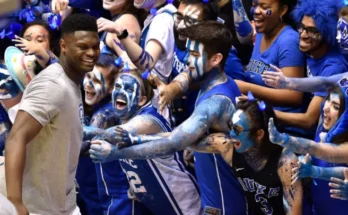For The First Time Since 1999, Oklahoma Sooners Left Off Preseason Coaches Poll, Reflecting Nation’s Doubts About Storied Program
For over two decades, the Oklahoma Sooners have been a constant fixture in the college football preseason coaches poll. Year after year, they’ve earned a place among the sport’s elite, a perennial powerhouse expected to contend for conference titles and national championships. But as the 2025 college football season approaches, a shocking development has made headlines and sent ripples throughout the college football landscape: for the first time since 1999, the Oklahoma Sooners are nowhere to be found on the preseason coaches poll. Not ranked. Not receiving significant votes. Just absent. And in a sport where perception often shapes reality, the message from coaches across the country couldn’t be louder or clearer—expectations for Oklahoma have dropped to a level few could have imagined just a few years ago.
For many fans of the crimson and cream, this moment feels like a rude awakening. Oklahoma football has long carried itself with the swagger of tradition. Seven national championships, multiple Heisman Trophy winners, and a near-mythical status in college football’s hierarchy. Even during transitional periods, even amid coaching changes or tough losses, the Sooners found a way to stay relevant. But now, relevance has given way to skepticism. College football coaches, many of whom once circled OU on their calendar as a test of toughness, now view the Sooners as a program in the midst of an identity crisis.
It’s hard to pinpoint a single moment that triggered this fall from grace. In truth, the descent has been gradual, a slow erosion of the foundation that once made OU so formidable. The departure of Lincoln Riley to USC in 2021, which at the time sent shockwaves through the sport, marked a turning point. Riley had been the architect of some of the most explosive offenses in recent memory, and under his leadership, the Sooners were not only winning but doing so in style. When he left, along with a number of high-profile recruits and assistant coaches, a vacuum formed—one that the program has struggled to fill.
Brent Venables, the defensive mastermind from Clemson, was tapped to take the reins and restore the physicality and toughness many felt had been missing. His vision was clear: re-establish a defensive identity, build from the trenches, and reassert Oklahoma’s presence as a blue-blood that wins with both grit and flair. But vision and execution are two very different things. In the years since his hiring, Venables has faced criticism for inconsistency, questionable game management, and a recruiting pipeline that, while promising on paper, has yet to deliver results on the field. The 2024 season ended with a disappointing 7-6 record, capped off by a loss in a mid-tier bowl game to an unranked opponent. The Sooners looked pedestrian—no longer feared, no longer exceptional.
What’s particularly notable about this year’s omission from the coaches poll is that it wasn’t a close miss. Oklahoma didn’t hover just outside the top 25. The votes simply weren’t there in meaningful numbers. And that speaks volumes. This isn’t a case of a team being underrated or flying under the radar. It’s a full-throated declaration from coaches around the country: the Sooners, right now, are not one of the best teams in college football.
It’s also worth considering the broader context of college football’s changing landscape. The move to the SEC, once viewed as an opportunity for Oklahoma to prove itself on the biggest stage, has instead exposed the program’s current weaknesses. Life in the SEC is unforgiving. Depth, speed, physicality—these aren’t optional, they’re mandatory. And while Oklahoma has flashes of all three, they’ve yet to display them consistently against the likes of Alabama, Georgia, LSU, and even rising programs like Ole Miss and Kentucky. The Sooners have been competitive, but rarely dominant. And in a league where second-tier status can quickly become a label, that perception can be hard to shake.
Recruiting has also become a growing concern. Oklahoma continues to land talented players, particularly on the defensive side of the ball, but the elite five-star athletes that once flocked to Norman now seem more intrigued by SEC rivals, Big Ten contenders, or flashy upstarts with innovative offensive schemes. NIL opportunities and media exposure have shifted the power centers of recruiting, and Oklahoma, despite its rich history, is finding it harder to compete for top-tier talent. Add to that a lack of recent postseason success, and the picture becomes even murkier.
Yet, to focus solely on the negatives would be to ignore the resilience that has long defined Oklahoma football. This is a program with deep-rooted traditions, passionate fans, and the infrastructure to turn things around quickly. Venables, despite the growing scrutiny, remains committed to the long-term vision. His recent hiring of new offensive coordinator Marcus Freeman—a young, energetic play-caller with a background in RPO-heavy systems—signals a shift toward modernization. The hope is that blending Venables’ defensive intensity with a more dynamic offense will help the Sooners regain their footing in the competitive SEC landscape.
Leadership within the athletic department also recognizes the urgency. University President Joseph Harroz Jr. and Athletic Director Joe Castiglione, both long-time stewards of OU athletics, have expressed public support for Venables while quietly pushing for results. They understand that the prestige of the entire athletic department—especially with the Big 12 era in the rearview mirror—hinges on the football program’s ability to succeed in its new environment. Stadium upgrades, NIL collectives, alumni engagement—all of it feeds into a larger plan to ensure Oklahoma doesn’t just survive the SEC gauntlet but thrives within it.
In some ways, being left off the coaches poll could be the best thing that happens to this team. Expectations, once sky-high and burdensome, are now effectively reset. There is no external pressure to perform at a national championship level this season. Instead, there’s an opportunity to rebuild, to refocus, and to prove doubters wrong on the field. Internal motivation can be a powerful force in college football, especially when fueled by perceived disrespect. If Venables can harness that energy, if the team can stay healthy and buy into the system, a return to prominence is not out of reach.
Of course, the road back won’t be easy. The 2025 schedule is one of the toughest in recent memory, with road games against Alabama and Texas A&M, a home showdown against Georgia, and a tricky non-conference matchup with Tulane—an increasingly respected Group of Five program. Every week will be a test. But every win, no matter how small, will feel like a step in the right direction.
The coaches poll, as flawed as it may be, offers a unique perspective because it reflects the collective wisdom—or skepticism—of those who understand the game best. And this year, those coaches have drawn a line. They’ve placed Oklahoma outside the circle of national contenders, perhaps temporarily, but definitively. That should sting for a program with so much pride. But it should also serve as fuel.
History tells us that great programs rise and fall in cycles. Alabama had its wilderness years. So did USC. Even Texas, now back in the national spotlight, spent over a decade fighting irrelevance. Oklahoma, for the first time in a generation, finds itself in a similar position. But the tools to climb back up are all there. The fanbase remains loyal and engaged. The resources are abundant. And the legacy—while currently dimmed—still casts a long shadow.
Whether the Sooners use this slight as a springboard or continue to drift remains to be seen. But one thing is certain: the rest of the college football world is no longer giving them the benefit of the doubt. Respect must now be earned, not assumed. And in a sport defined by its passion, tradition, and unforgiving nature, the challenge has never been greater—or more important.



